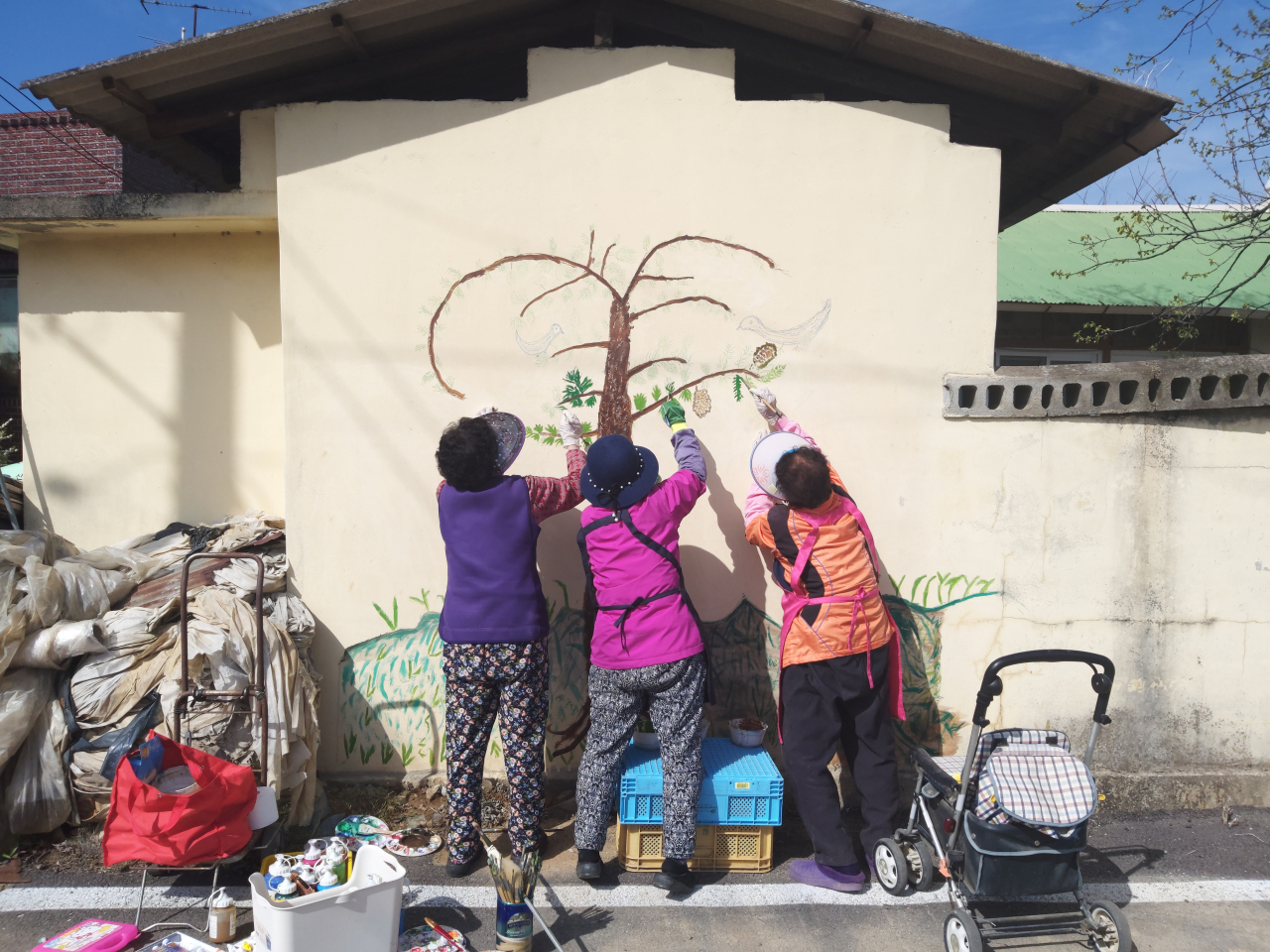 |
Women paint a wall at a village in Sinpung-ri, Yecheon, North Gyeongsang Province, in 2021. (Sinpung Art Museum) |
YECHEON, North Gyeongsang Province -- The small, private Sinpung Art Museum in Yecheon, North Gyeongsang Province, is filled with the laughter and babbles of visitors breaking the silence in a rural, farming village with a population under 1,500.
The village is located about 2 1/2 hour's drive southeast of Seoul, or 1 1/2 hours from Daegu, the largest nearby city.
Not many people may be familiar with Sinpung Art Museum now, but it has started to earn some recognition in the last few years for it's unexpected local artists: the Sinpung grandmothers.
Arriving in style on a scooter, pushing mini shopping carts or in a white van, the aged women are all smiles and excitement.
Sinpung Art Museum invites 30 women in their 70s to 90s to an art class on Wednesdays, providing the matrons who have spent their entire life taking care of their families and farms with the opportunity to experience the world of art.
“Today, we will be drawing something that is related to fall. What kind of color pops into your head, when you picture fall? You can draw anything that comes to your mind,” Sinpung Art Museum director Lee Seong-eun says, signaling the beginning of the class.
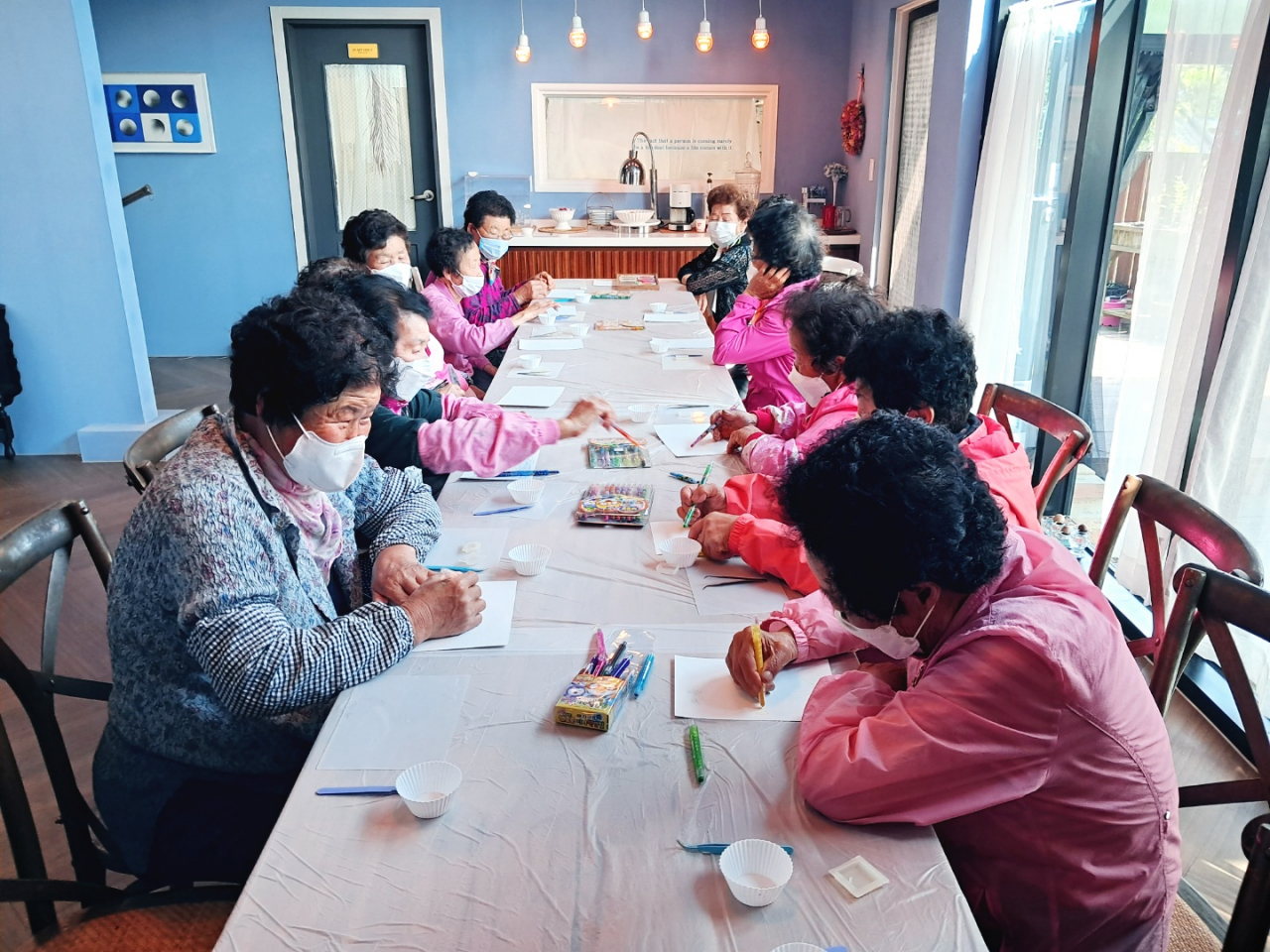 |
Sinpung grandmothers start drawing with the theme of the fall season during an art class on Sept. 28. (Lee Si-jin/The Korea Herald) |
As paper, colored pencils and other art materials are placed on the table, the chattering ladies turn into serious, passionate students.
Though their pastel strokes may appear unprofessional, the Sinpung grandmothers set about expressing their thoughts at once, without hesitation.
“Our Grandmothers’ Art School started as an art education program in 2010. It all started with a decision to follow my husband, who wished to look after his mother in Sinpung-ri, Yecheon, 12 years ago,” Lee told The Korea Herald.
The program was intended as a form of art therapy.
“After starting a new life in the small village, I recognized that many of the halmae ('grannies' in Korean) suffered from depression. They only knew how to keep their emotions inside without expressing in other forms. And an old halmae died by suicide. I really wanted to help them,” Lee said.
Lee, who majored in art education and history, offers various art experiences for students, ranging from handcrafts to acrylic painting. The program has a lunch time, field trips and vacation periods, like ordinary schools, according to Lee, who emphasized the importance of having lunch together.
According to Lee, many older women in the village seem to become a little indifferent to their daily meals. The lunch break provides a special time for them to meet up with friends and share interesting stories.
While many people felt reluctant to include lunch time in the art classes, Lee said she felt lunch time to be the essence of her art class, allowing the participants to open up.
The director and two assistant teachers prepare the meals.
“I look forward to Wednesdays, because of the art class. It brings me great joy in my life. Many things happen in a week, so I can’t wait to share the stories with other halmae,” Kim Kyeong-hee, a grandmother in her 80s, told The Korea Herald.
Kim and her classmates shared that one fascinating experience was drawing their late husbands, mentioning that it gave them time to recall how their lovers looked in the past.
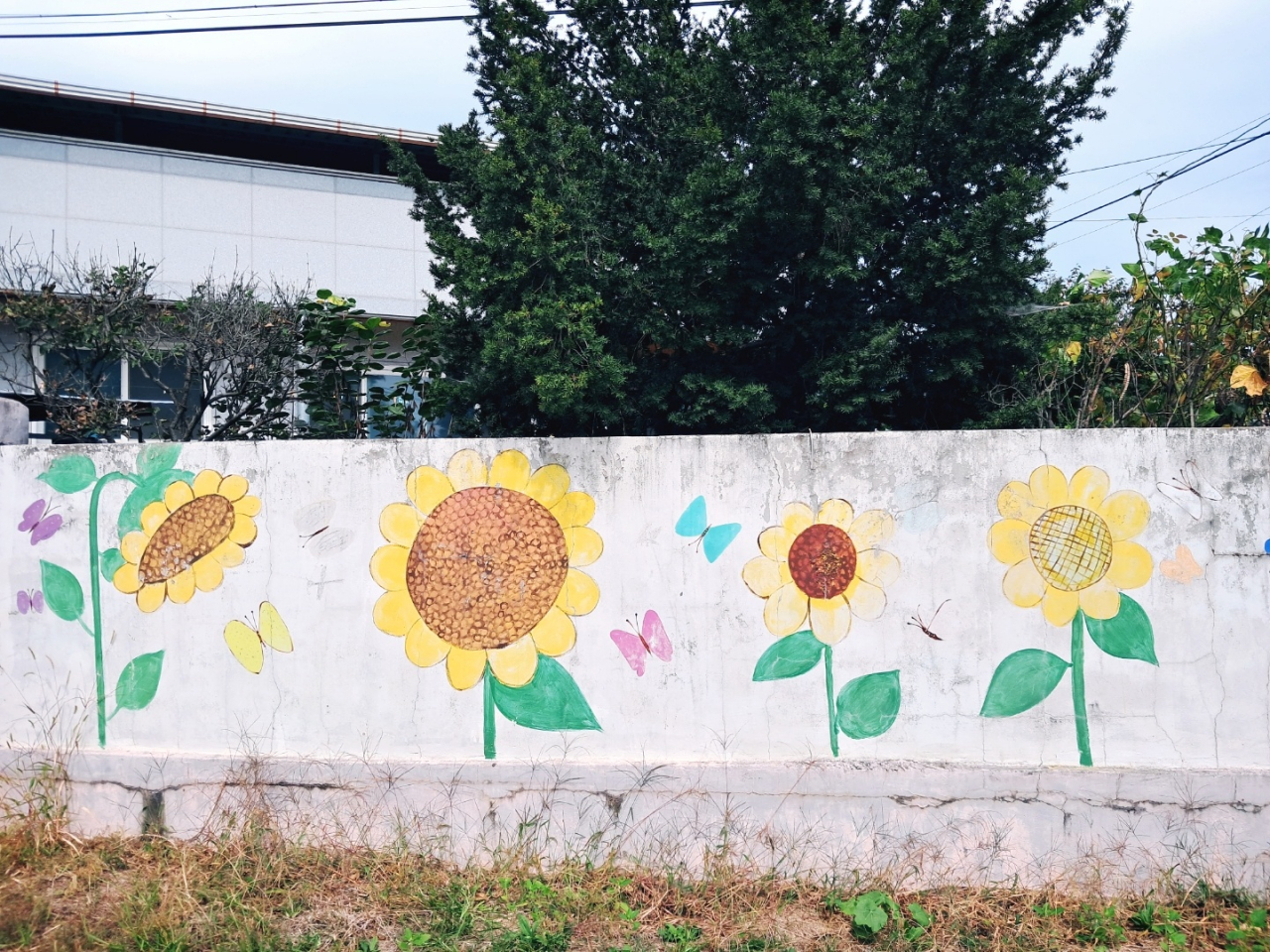 |
Sunflowers and butterflies decorate a wall in Sinpung-ri, Yecheon, North Gyeongsang Province. (Lee Si-jin/The Korea Herald) |
“I want to improve my drawing skill, but my hands don’t really move as I want them to. If I learn more about art, I want to draw something like Cheong Wa Dae. It is never too late to become an artist,” another woman, who wished to remain anonymous, added.
Works by the Sinpung grandmothers have been exhibited at several museums, including the Sinpung Art Museum, surprising museumgoers of all ages.
Acrylic paintings titled “Throwing Away Hwatu, Drawing Hwatu” and “9-cheop Bansang” caught many viewers' interest when they featured in television shows including KBS’ “Hometown Report” (2021), EBS’ “World Trip” (2021) and tvN’s “The Backpacker Chef.”
While “Throwing Away Hwatu, Drawing Hwatu,” which features images of Korean playing cards, expressed the playful side of the grandmothers, “9-cheop Bansang” -- a Korean meal with nine side dishes and rice -- resonated with many viewers for expressing the grandmothers’ love for their families who were not able to visit them during the COVID-19 pandemic.
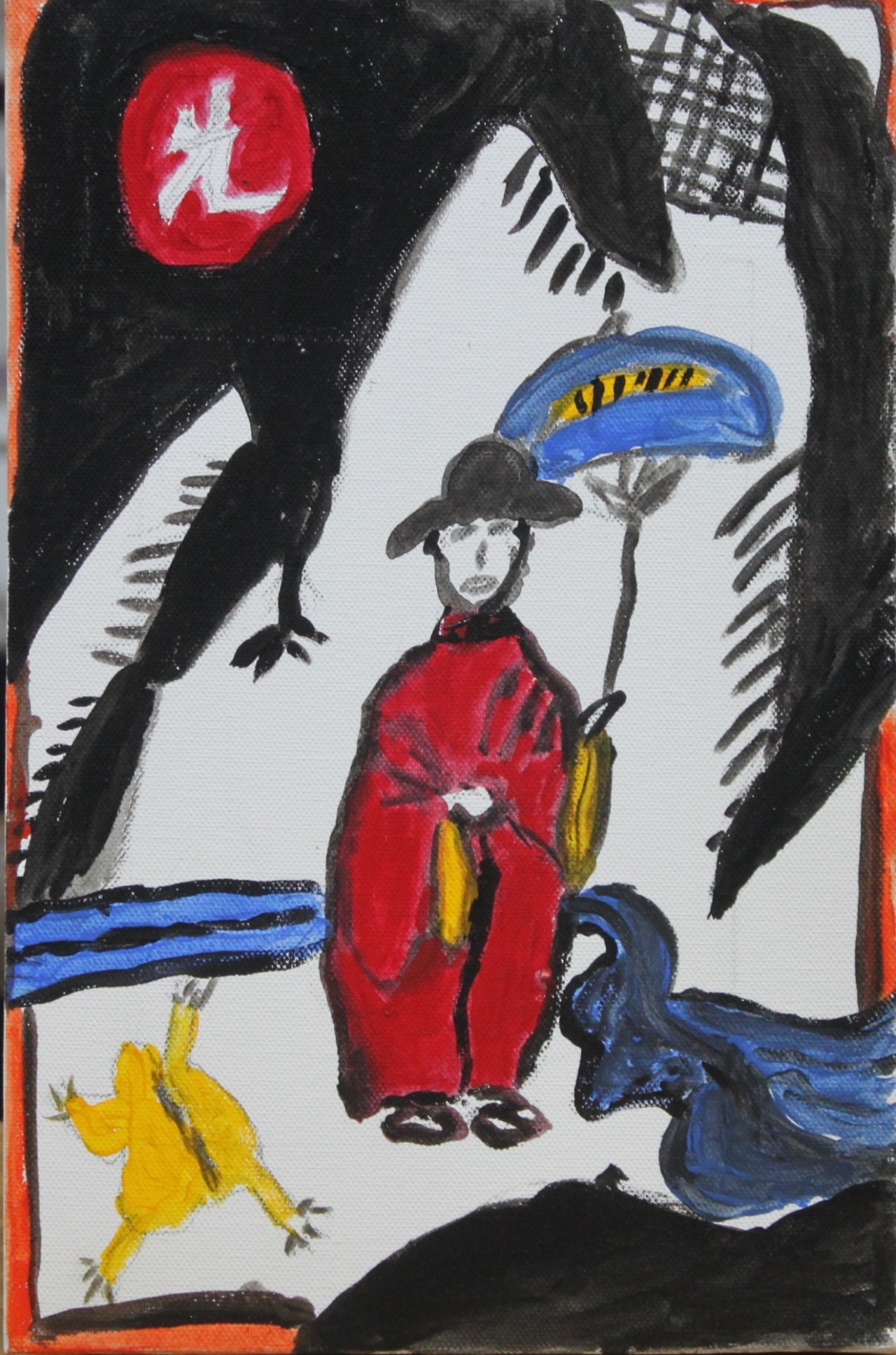 |
“Throwing Away Hwatu, Drawing Hwatu,” an acrylic painting by Kim Kyeong-hee (Sinpung Art Museum) |
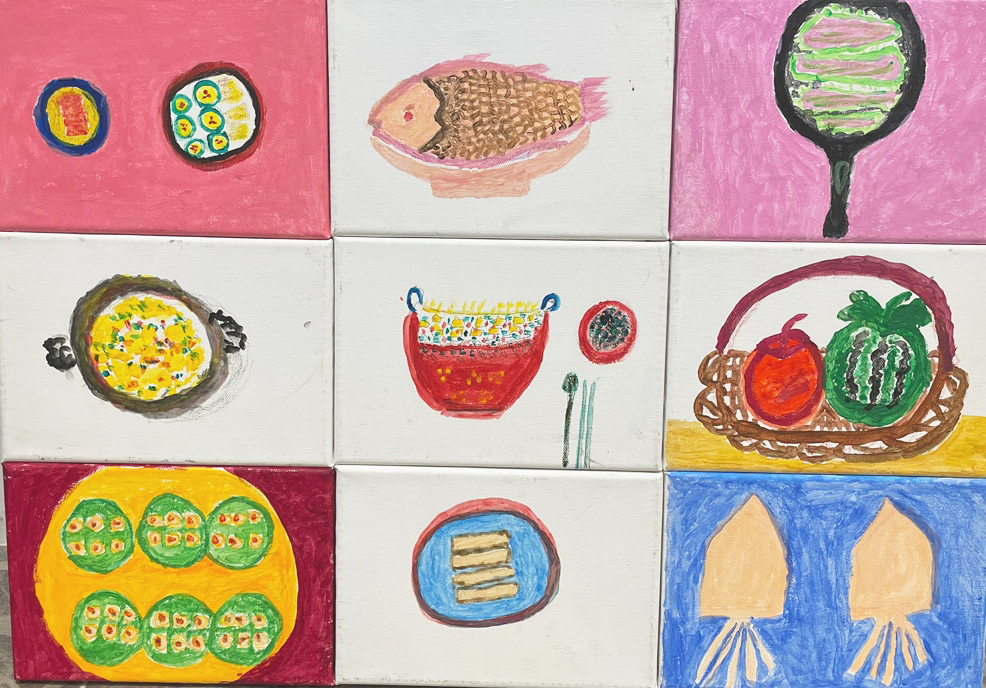 |
“9-cheop bansang” (Sinpung Art Museum) |
“Many local governments contacted me and Sinpung Art Museum to learn about our programs, believing art classes to be a way to bring vibrancy to the rural areas and villages. Unfortunately, we don’t really have a planned curriculum. Many things are improvised depending on the grandmothers’ condition,” the director said.
“We are making various attempts to share the grandmothers’ works with the wider audience, including with the use of virtual reality technology. It is my biggest pleasure to see the halmae learning ways to express their thoughts and imagination with art.”







